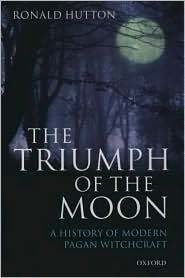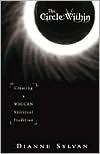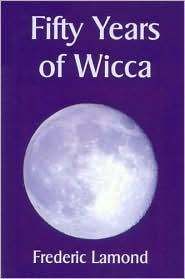I'm trying to be more focused. Sometimes when I'm feeling good I think I have all this potential, and it's just a question of letting it out. It's a real struggle to maintain that feeling of connectedness sometimes. For a lot of people, reading and writing is a very airy sort of thing. A higher pursuit that requires thought, discernment, and hopefully, ultimately, the acquisition of knowledge and wisdom. All very Easterly. But for me, a different effect is achieved. Research grounds me. Writing keeps me centered. The physical act of reading comforts me. The more I reach outside of myself and consider things beyond, the more connected I feel to the rest of the world and the more I think I could do something positive with my life. In my room, my books are in the North. I didn't do it on purpose, it just worked out that way, and thinking about it now it makes sense to me.
Right now I'm reading Kaatryn MacMorgan-Douglas's Wicca 334: Further Advanced Topics in Wiccan Belief. KMD is a Priestess of the Universal Ecelectic Tradition, which I know nothing about, but many of her books are of immediate relevance to all Wiccan Traditions and I really enjoy them. I was really excited when I saw that she'd released a sequel to Wicca 333. The chapter I'm reading now is on sacred space and defining what is sacred and what isn't. A lot of Wiccans struggle with this idea. If the Divine exists in all things, then all things are sacred, be they people, animals, plants, or inanimate objects.
It's easy to say things like that. Everyone seems to always be talking about the sacredness of the world, but most people don't want to extend sacredness to things like guns and pavement, buildings and cars. Is everything really sacred or is that something to which Wiccans only pay lip service? Additionally, if thoughts are things and all things are sacred, are all thoughts sacred? Or is sacred a relative term? My athame is sacred to me, but there are many in this world who believe all weapons to be evil. Taking that idea further, are all actions sacred? Terrorist attacks are considered sacred, holy acts by many who now perpetrate them. Can something be sacred just inherently or does someone have to declare it to be sacred? How can the sacred be relative if the Divine exists all things?
Yeah, this is what I do with my free time. And this to me is what Wicca is about: trying to come up with answers to these questions. If we're not asking them to begin with, then what are we doing?
In which I post about the goings-on related to my Craft, rant about the wider Community (which I alternate between loving and hating, but almost always avoid either way), talk about books, and whine more than I like to admit. It's a party. And you're invited.
Friday, February 6, 2009
Tuesday, February 3, 2009
Imbolc Date Discrepancies Explained
Imbolc is not on February second. It might be on February fourth, but it's not on February second. I'll explain.
So there's this popular lady on YouTube who calls herself TipToeChick. I've watched a few of her videos, but it's not really my thing. I can see that she's really got a following, though, and she recently started a blog that you can check out here. If we were a spectrum, I think I might be on the other end, but that's okay. Anywho, she just made a post listing the sabbats and their dates in the year 2009 and there was a lot of confusion in her comments because she listed Imbolc as being on the fourth of this month (as well as Samhain on November 8, Beltane on May 6, and Lammas on August 8), when common Wiccan practice states that Imbolc is on February 2. So basically all of her comments were along the lines of, "Wait! Isn't Imbolc on the second?!"
No, no it's not. Most Wiccans seem to celebrate it then, but it's not. Imbolc as Wiccans originally observed was based on a pre-Christian Celtic festival marking midwinter. Early Wiccans, Gardner included, called the holiday "February Eve," and practiced their rites the night before the first day of February and into the next day. Things got confusing when we decided that Imbolc and Candlemas were the same holiday. Candlemas is a Catholic holiday celebrating the presentation of Jesus at the Temple in Jerusalem, described in Luke 2:22-40. Candlemas is celebrated by Catholics either on February 2 or on the Sunday between January 28 and February 3. It's not a Wiccan holiday. I'm not sure where the idea that Wiccans observe Imbolc on february 2 comes from, but thanks to mass market publishing and newbies teaching newbies, everyone now thinks that Imbolc is February 2. This is also why everyone thinks that Halloween and Samhain are the same holiday. They're not. Halloween is on October 31. Samhain is on November 1. Gardnerian and Gardnerian-derived groups celebrate "Samhain Eve," so they often circle on October 31. But they're not celebrating Halloween. They're celebrating the night before Samhain. Kind of like how Christians have festivities on Christmas Eve, even though Christmas is the next day.
So back to TipToeChick. The dates she quoted are the astrological dates of the sabbats. I'm not an astrologer and as a general rule have little to no interest in astrology, but plenty of Wiccans do. So there are some Wiccans out there who celebrate Imbolc (a.k.a. midwinter) when the sun falls midway in the sign of Aquarius. The sun moves through twelve different astological signs over the course of the year (roughly three signs per season). So, midwinter falls halfway through the second winter sign - Aquarius. Ta da! Ditto for the other weird dates she listed for Samhain, Beltane, and Lammas (Lughnassadh, more appropriately). They're the halfway points in their respective signs. It's pretty unusual for Wiccans to observe this way, but it certainly happens.
So there's this popular lady on YouTube who calls herself TipToeChick. I've watched a few of her videos, but it's not really my thing. I can see that she's really got a following, though, and she recently started a blog that you can check out here. If we were a spectrum, I think I might be on the other end, but that's okay. Anywho, she just made a post listing the sabbats and their dates in the year 2009 and there was a lot of confusion in her comments because she listed Imbolc as being on the fourth of this month (as well as Samhain on November 8, Beltane on May 6, and Lammas on August 8), when common Wiccan practice states that Imbolc is on February 2. So basically all of her comments were along the lines of, "Wait! Isn't Imbolc on the second?!"
No, no it's not. Most Wiccans seem to celebrate it then, but it's not. Imbolc as Wiccans originally observed was based on a pre-Christian Celtic festival marking midwinter. Early Wiccans, Gardner included, called the holiday "February Eve," and practiced their rites the night before the first day of February and into the next day. Things got confusing when we decided that Imbolc and Candlemas were the same holiday. Candlemas is a Catholic holiday celebrating the presentation of Jesus at the Temple in Jerusalem, described in Luke 2:22-40. Candlemas is celebrated by Catholics either on February 2 or on the Sunday between January 28 and February 3. It's not a Wiccan holiday. I'm not sure where the idea that Wiccans observe Imbolc on february 2 comes from, but thanks to mass market publishing and newbies teaching newbies, everyone now thinks that Imbolc is February 2. This is also why everyone thinks that Halloween and Samhain are the same holiday. They're not. Halloween is on October 31. Samhain is on November 1. Gardnerian and Gardnerian-derived groups celebrate "Samhain Eve," so they often circle on October 31. But they're not celebrating Halloween. They're celebrating the night before Samhain. Kind of like how Christians have festivities on Christmas Eve, even though Christmas is the next day.
So back to TipToeChick. The dates she quoted are the astrological dates of the sabbats. I'm not an astrologer and as a general rule have little to no interest in astrology, but plenty of Wiccans do. So there are some Wiccans out there who celebrate Imbolc (a.k.a. midwinter) when the sun falls midway in the sign of Aquarius. The sun moves through twelve different astological signs over the course of the year (roughly three signs per season). So, midwinter falls halfway through the second winter sign - Aquarius. Ta da! Ditto for the other weird dates she listed for Samhain, Beltane, and Lammas (Lughnassadh, more appropriately). They're the halfway points in their respective signs. It's pretty unusual for Wiccans to observe this way, but it certainly happens.
Monday, February 2, 2009
My Recommended Reading List, abridged
I celebrated Imbolc yesterday after a day spent cleaning and hanging out with friends. R and I went to the flea market and he found me a pair of horns for my Oya altar. I'm really pleased with them. I need to hunt around and see if I can't dig up something to use as an altar cloth.
I wanted to make a post regarding my favorite books, simply because everyone seems to have a list, and I think the best books are sadly under-represented. Most of them can't be had if you only frequent large mainstream booksellers (but some of them can), and so they tend to go unread. These aren't in any particular order, and I've made the cover images into links so that if you want to purchase them, you can do so. I'm not saying that you shouldn't go out and read Ray Buckland or whoever else. I think if you're serious you should be reading and analyzing anything you can, but there are definitely some books that are better than others (not-so-great books are frequently distinguished by sparkley covers and/or authors who are named after animals). These are the ones that I wish someone had recommended to me when I was introduced to Wicca.

The Triumph of the Moon by Ronald Hutton
This is easily the best secular, objective books on Wicca ever published. Period. Hutton is not Wiccan. He's not even Pagan. He's a British historian and an authority on European paganism (small "p" intentional). In this book, Hutton closely examines Wiccan history, belief, and practice from the very beginning. He addresses Wicca's origins, surrounding influences, evolution, and spread over seas. My copy is marked up and tabbed. I've read it several times, and every time I learn something new. Almost every Wiccan history book available today (that isn't totally false) is just an abridged version of Hutton. Save yourself time and money and just read this one.

The Circle Within by Dianne Sylvan
I adore this book and I think it would appeal to anyone regardless of Tradition. The subtiltle is Crafting a Wiccan Spiritual Tradition and that pretty much says it all. Sylvan writes plainly about incorporating Wicca into daily life. If you're one of those people who laments not having time to practice, then you need this book. Sylvan discusses the need for daily prayer and ritual without imposing her own personal beliefs. I reread this book periodically because I find it to be very inspiring.

Witchcraft Today by Gerald Gardner
If you're Wiccan, you need to have read Gardner. Whatever your Tradition, odds are most of it comes from him and his cohorts. Besides, he's quirky and very British and some of the conclusions he draws are hilarious (my personal favorite being that because "Robin" is an old French-English word for "spirit" and "Hood" is just another word for "wood", Robin Hood MUST be a mythical form into which witches could transform at will. WHAT.) What modern Wiccans practice today makes so much more sense (or not) after you've read the first book ever published on Wicca.

Fifty Years of Wicca by Frederic Lamond
Read this book simultaneouly to Witchcraft Today. Gardner will make a lot more sense. Frederic Lamond was one of the the witches in Gardner's original coven. We're lucky to still have him and even luckier that he decided to write books. This is Lamond's memoir. He discusses how and why he came to Wicca and writes about his experiences as Gardner's friend and covenmate. I think there's a lot to be learned by reading primary sources, and this is one of the few that we have.

The Heart of Wicca by Ellen Cannon Reed
Ellen Cannon Reed is non-Gardnerian, but she's still Trad Craft, and that's the perspective from which she writes. To Reed, and to myself, Wicca is an initiatory mystery tradition. In The Heart of Wicca, she discusses her experiences as a High Priestess, the value of initiation and training, the importance of history, and she does it all without devaluing the solitary experience. I think most people will either love or hate this book, but I adore it. If you're a solitary, eclectic practitioner, this book will offer you a perspective on the Craft that you might not have been exposed to before.
I'll write plenty more on books, I'm sure. There are plenty of really excellent ones out there, so don't limit yourself to Cunningham (also an important author, but I'm assuming you know that).
I wanted to make a post regarding my favorite books, simply because everyone seems to have a list, and I think the best books are sadly under-represented. Most of them can't be had if you only frequent large mainstream booksellers (but some of them can), and so they tend to go unread. These aren't in any particular order, and I've made the cover images into links so that if you want to purchase them, you can do so. I'm not saying that you shouldn't go out and read Ray Buckland or whoever else. I think if you're serious you should be reading and analyzing anything you can, but there are definitely some books that are better than others (not-so-great books are frequently distinguished by sparkley covers and/or authors who are named after animals). These are the ones that I wish someone had recommended to me when I was introduced to Wicca.

This is easily the best secular, objective books on Wicca ever published. Period. Hutton is not Wiccan. He's not even Pagan. He's a British historian and an authority on European paganism (small "p" intentional). In this book, Hutton closely examines Wiccan history, belief, and practice from the very beginning. He addresses Wicca's origins, surrounding influences, evolution, and spread over seas. My copy is marked up and tabbed. I've read it several times, and every time I learn something new. Almost every Wiccan history book available today (that isn't totally false) is just an abridged version of Hutton. Save yourself time and money and just read this one.

I adore this book and I think it would appeal to anyone regardless of Tradition. The subtiltle is Crafting a Wiccan Spiritual Tradition and that pretty much says it all. Sylvan writes plainly about incorporating Wicca into daily life. If you're one of those people who laments not having time to practice, then you need this book. Sylvan discusses the need for daily prayer and ritual without imposing her own personal beliefs. I reread this book periodically because I find it to be very inspiring.

If you're Wiccan, you need to have read Gardner. Whatever your Tradition, odds are most of it comes from him and his cohorts. Besides, he's quirky and very British and some of the conclusions he draws are hilarious (my personal favorite being that because "Robin" is an old French-English word for "spirit" and "Hood" is just another word for "wood", Robin Hood MUST be a mythical form into which witches could transform at will. WHAT.) What modern Wiccans practice today makes so much more sense (or not) after you've read the first book ever published on Wicca.

Read this book simultaneouly to Witchcraft Today. Gardner will make a lot more sense. Frederic Lamond was one of the the witches in Gardner's original coven. We're lucky to still have him and even luckier that he decided to write books. This is Lamond's memoir. He discusses how and why he came to Wicca and writes about his experiences as Gardner's friend and covenmate. I think there's a lot to be learned by reading primary sources, and this is one of the few that we have.

Ellen Cannon Reed is non-Gardnerian, but she's still Trad Craft, and that's the perspective from which she writes. To Reed, and to myself, Wicca is an initiatory mystery tradition. In The Heart of Wicca, she discusses her experiences as a High Priestess, the value of initiation and training, the importance of history, and she does it all without devaluing the solitary experience. I think most people will either love or hate this book, but I adore it. If you're a solitary, eclectic practitioner, this book will offer you a perspective on the Craft that you might not have been exposed to before.
I'll write plenty more on books, I'm sure. There are plenty of really excellent ones out there, so don't limit yourself to Cunningham (also an important author, but I'm assuming you know that).
Subscribe to:
Comments (Atom)